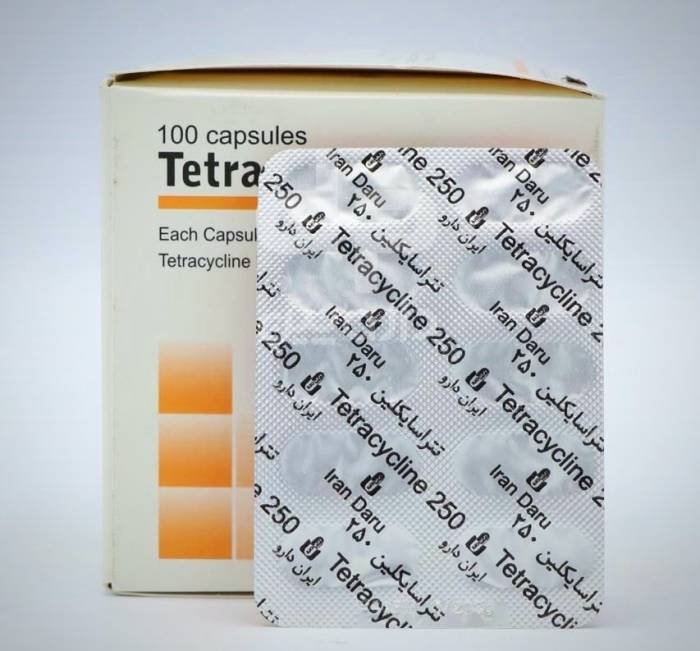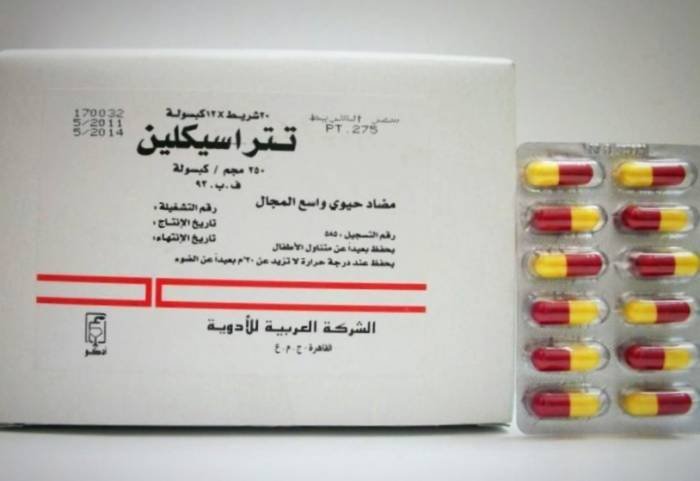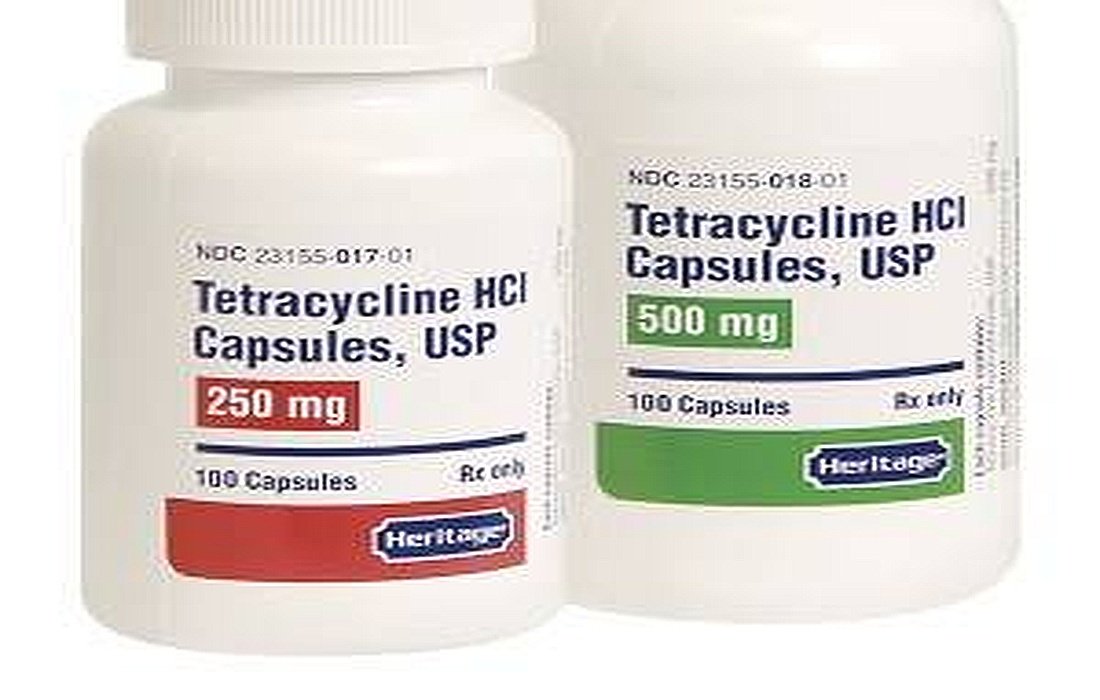CapsuleTetracyclineWhat is it and what problems does it treat?
TetracyclineAntibioticwhich is used to treat many bacterial infections, including urinary infections, acne, gonorrhea, and chlamydia. Tetracycline is available under various brand names, including: Suromycin, Astetitin, and Akromycin.
Tetracycline capsules are effective against bacteria. Due to its absorption by bones, Tetracycline is used as a marker in human biopsy studies for bone growth. This drug is used in the treatment ofChronic Bronchitisinfections caused by Brucella, Chlamydia, Mycoplasma, Rickettsia, and also in the treatment ofAcneVulgaris and plural effusion caused by cirrhosis or malignant diseases. The drug is absorbed orally and excreted through the kidneys and bile. Tetracycline is available in capsule, topical ointment, and eye drop forms.

Dose of Tetracycline:
If in capsule or tablet form, take 250-500 mg.
If in syrup form, take 5-125 mg.
Prescribed dosage by a doctor:
- If suffering from chronic or acute bronchitis, take 500 mg orally every 6 hours.
- For treating acne, take 250-500 mg orally every 12 hours.
- If infected with ehrlichiosis, take 500 mg orally every 6 hours for 7-14 days.
- If suffering fromcholera diarrheafor adults, take 500 mg orally every 6 hours for 3 days, but for children, take 25 mg per kg of body weight every 6 hours.
- (Note: Do not exceed 1 gram, as it may cause numerous side effects!!!)
- If suffering from acute malaria, in adults, take 500 mg orally every 6 hours for 7 days along with colloidal glucose.
- In children under 8 years of age, Tetracycline is not recommended due to tooth discoloration and hypoplasia. In children over 8 years, take 25-50 mg orally every 6 hours.
*In cases of kidney disorders with creatinine clearance (renal excretion rate) of 50-58 mL per minute, it is typically taken every 8-12 hours.
If creatinine clearance is between 10-50 mL per minute, typically take every 12-24 hours; if less than 10 mL per minute, recommended once every 24 hours.
How to use Tetracycline:
Take Tetracycline capsules on an empty stomach (one hour before or two hours after meals) with a glass of water.
Never take with dairy products.

What are the side effects associated with Tetracycline?
- Tooth discoloration and enamel hypoplasia in young children.
- Diarrhea
- Nausea
- Sensitivity to light
- Stomach upset
- Loss of appetite
- White patches in the mouth or on the lips
- Swollen tongue
- Bulging of the cranial skull space in newborns
- Sore throat
- Difficulty swallowing
- Dizziness
- Headache
- Wounds or swelling in the rectal area or genital tract
Some rare side effects of Tetracycline include:
- Stomach cramps
- SyndromeDiabetesTesticular
- Esophageal problems
- Pseudomembranous colitis associated with antibiotics
- Bulging of the cranial skull space in newborns
- Skin dermatitis
- Increased intracranial pressure
- Itching
- Loss of appetite
- Pancreatitis
- Pericarditis
- Darkening of nails
- Vomiting
- Facial nerve paralysis
The most serious side effects of Tetracycline include:
- Sunburnor sensitivity to sunlight
- Muscle pain
- Changes in urination volume
- Brownwhitening and graying of teeth
- Numbness or tingling in hands and feet
- Unexplained fatigue
- New infection symptoms (Sore throatpersistent and feverish)
- Bruising or bleeding
- Severe stomach or abdominal pain
- Yellowing of eyes and skin
- Dark urine color changes
The points mentioned here on healthSelMagzare not a complete list of Tetracycline’s side effects and other side effects may also occur.
What drugs does Tetracycline interact with?
As we mentioned in the health section of SelMagz, Tetracycline interacts with drugs such as Astretnin, Flibanserin, Lomitapid, and Tretinoin. Tetracycline mainly has serious interactions with at least 71 drugs, moderate interactions with 46 drugs, and weak interactions with 26 drugs. Therefore, it is essential to consult your doctor on this matter.
Warnings and Precautions:
– When using and being sensitive to Tetracycline, avoid taking Akromycin, Suromycin, and Astetitin.
– Keep this medication out of reach of children, and if overdosed, seek immediate medical attention.
Children under 12 years should not take this medication due to its effects.
Using topical Tetracycline can lead to increased skin sensitivity and trigger allergies with subsequent systemic or topical applications.
If you have liver failure, use this medication very cautiously.
After taking this drug, avoid simultaneous use of antacids, calcium and iron supplements, magnesium-laden laxatives,sodium bicarbonate, milk, and dairy products for 1-3 hours.The patient should not be exposed to sunlight or ultraviolet lamp rays.
After taking
Tetracycline capsulesdrink plenty of water.Tetracycline in children under 8 years can disrupt bone and tooth structure and cause discoloration.
Tetracycline deposits in the bones
of the fetusand can cause bone deformities or growth cessation. Therefore, this medication should only be used duringpregnancyin emergencies and under a doctor’s prescription as self-medication poses risks to the fetus.Individuals allergic to Tetracycline should not take this medication.
This medication should not be used during breastfeeding as it passes into breast milk. Taking Tetracycline while breastfeeding can diminish the calcium present in breast milk.
Contraindications for Tetracycline:

Allergy to the drug
- Severe liver dysfunction
- In case of Fanconi syndrome
- During tooth development (third trimester
- of pregnancyup to 8 years) due to permanent color change in teeth, it should not be consumed.Cautions:
Check the expiration date of the medication, as expired Tetracycline can be highly nephrotoxic.
Do not take this medicine with antacids, milk, dairy products, or calcium-rich foods.
If there are kidney disorders, consult your doctor to reduce the dosage.
For long-term use, consider its injectable form.
Benefits of Tetracycline Capsules







